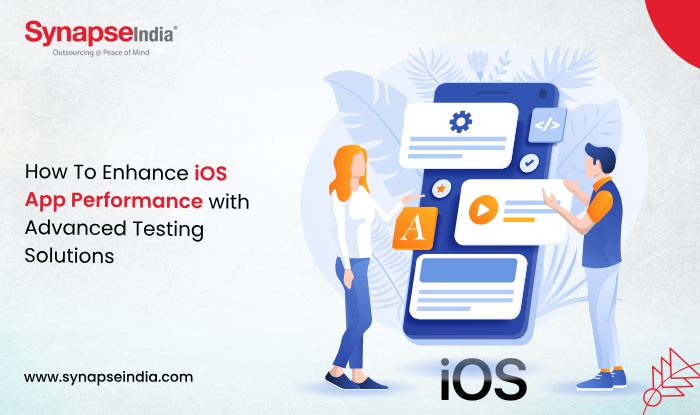 16 Nov 2024
16 Nov 2024
Apps with high performance stand out from the competition and go a long way in improving user retention. iOS app performance testing helps deliver consistent performance with fewer to no crashes and helps improve your brand identity.
It is not very difficult to create a good iOS mobile application that delivers desired outcomes, but it is certainly a challenge to develop a high-performance app that offers a seamless experience. Apple users who mostly comprise a young demographic expect their mobile apps to offer fluid interactions and fast load times. Although achieving and maintaining this standard can be difficult without rigorous testing practices, leveraging advanced testing solutions can help diagnose performance issues, optimize speed, and enhance overall app functionality. If you are also looking forward to creating flawless iOS apps for your business, getting in touch with iOS app development experts is highly recommended.

iOS app performance testing is essential not only for meeting user expectations but also for maintaining stability, optimizing resource usage, and achieving competitive advantage. Performance testing contributes to a better app lifecycle, as it reduces post-release bugs, enhances ratings, and positions the app for long-term success in the App Store. Let us discuss in detail the different reasons why performance testing is important for iOS apps.
If an app is slow or crashes frequently, chances are the users will uninstall it which could not only hurt your profits but damage your reputation as well. Performance testing helps identify and fix issues that could lead to uninstallation. In other words, it helps meet user expectations for fast and flawless interaction by ensuring the app loads quickly.
Competitive advantage is very important in this fast-paced world where one can find a multitude of apps for every single purpose. A high-performing and stable iOS application can help deliver positive experiences to your users. Not only this will support loyalty and retention, but when these happy customers recommend your app to others, your brand popularity and visibility will be enhanced.
Apps that consume excessive battery drain can frustrate users. Also, iOS devices have limited memory resources, and poorly managed memory usage can lead to app crashes and poor performance. Performance testing helps identify areas where battery consumption can be optimized and by testing memory usage, developers can prevent excessive memory consumption and leaks, enhancing app stability.
Depending on its objective, an iOS app might rely heavily on network connectivity. In another scenario, users might be accessing your apps in a low-bandwidth cellular or Wi-Fi network. Under both these circumstances efficient data handling is critical. Network performance testing allows developers to ensure smooth functionality across varying network conditions, improving reliability for users in all environments.
iOS devices vary widely in processing power, screen size, and OS version. It is important to ensure the app delivers a consistent experience across different device models, preventing device-specific issues from affecting the user experience and performance testing can help with that.
Every year Apple releases major iOS updates. This change in the operating system can affect the performance of your app. Regular performance testing is important to ensure the app adapts smoothly to new OS features and optimizations.
As the user base grows, the app must be able to handle increased load without slowing down or crashing. For apps like e-commerce or ticketing, performance during peak usage times is critical. Load testing ensures the backend infrastructure and APIs can support high traffic without degrading the user experience.
Post-release issues can impact user satisfaction and damage brand reputation. Performance testing helps ensure that the app is reliable and stable, minimizing the risk of downtime that would require emergency patches or maintenance.
Through comprehensive performance testing, developers can create a robust, scalable, and enjoyable app that aligns with both user demands and their standards. Here are some ways to enhance the performance of iOS mobile apps with advanced testing solutions.
Profiling tools provide detailed reports on how an app utilizes system resources, which helps in identifying bottlenecks early. You can use tools like Xcode to profile CPU, memory, disk, network usage, etc., Firebase to monitor launch time, app render times, network request traces, etc., and GPU Frame Capture to analyze rendering performance and detect issues with GPU-bound code. These tools can provide you insights into the specific areas where your app is underperforming.
Load testing ensures that the app can handle a large number of simultaneous users without compromising performance. By integrating load testing into the development pipeline, you can identify backend bottlenecks and optimize accordingly. Simulating heavy traffic helps developers predict how the app will perform under real-world conditions and make necessary adjustments. BlazeMeter, a cloud-based tool can perform extensive load tests, simulating multiple users across different regions and XCTest can be used alongside the load-testing setup to test backend efficiency under load.
Network latency and packet loss can significantly degrade app performance, especially for apps that rely heavily on real-time data. Effective network testing allows developers to fine-tune the app to handle connectivity changes gracefully, reducing the likelihood of user frustration due to network issues. Network testing involves simulating different network conditions (like 3G, 4G, 5G, or Wi-Fi) to understand how the app performs under each scenario. Network Link Conditioner lets you simulate network environments to observe how the app responds to network latency, packet loss, or bandwidth limitations.
Automated testing has become indispensable in mobile development, especially for performance testing that needs to run frequently across different scenarios. It can cover repetitive tasks, freeing up developers to focus on more complex issues while continuously monitoring and optimizing app performance.
Appium is an advanced open-source test automation tool that supports cross-platform testing for iOS and Android. Moreover, using Xcode’s built-in testing frameworks you can automate UI and performance tests.
Memory management is crucial in iOS due to the limited resources of mobile devices. Testing for excessive memory usage and optimizing battery consumption are essential steps in performance enhancement. By optimizing memory and energy usage, you ensure that the app runs smoothly without draining the device’s resources.
Use the Leaks and Allocations instruments to identify memory leaks and excessive allocations that can slow down your app. Available in Xcode, Memory Graph Debugger is another tool that can be used to get a visualization of memory usage, helping developers locate retain cycles and other memory issues.
Testing on real devices ensures that you catch device-specific bugs that may not appear in emulators, leading to a more polished final product. Cloud-based device testing solutions allow you to test on a variety of iOS devices, saving the time and expense of maintaining a physical device lab.
BrowserStack is an effective iOS testing tool that provides access to a range of iOS devices for real-time testing, allowing you to test app performance across different models and OS versions. Google’s Firebase Test Lab offers automated and manual testing on various iOS devices, making it easier to detect device-specific issues.
AI-driven testing solutions can help predict potential performance issues by analyzing historical data and identifying patterns that may cause bottlenecks. By incorporating AI-driven testing, you can detect issues that would be challenging to find manually, improving the overall reliability of your app.
HeadSpin offers AI-driven performance monitoring that provides insights into network, device, and user experience metrics, helping you anticipate potential problems. Another AI-powered cloud-based testing tool Perfecto offers predictive analysis and automated error detection.
Looking for expert iOS app development services to enhance your app's performance? Our team specializes in iOS App Performance Testing, ensuring your app runs smoothly, efficiently, and reliably. With advanced tools and testing methods, we identify and resolve bottlenecks, optimize memory and battery usage, and enhance network efficiency for a seamless user experience. Our custom iOS app development approach allows us to tailor our performance testing strategies to your app's unique requirements, helping you meet user expectations and maintain a competitive edge in the App Store.

Enhancing iOS app performance with advanced testing solutions is essential to meet user expectations and stay competitive. An expert developer can systematically improve their app’s performance, leading to a highly optimized app that delivers a premium user experience. With the right tools and testing strategies in place, they can enhance your iOS app’s performance, reduce churn, and increase user satisfaction. So, partner with a professional iOS app development company to implement advanced testing solutions today and watch your app’s performance reach new heights!

 23 Mar 2022
23 Mar 2022
